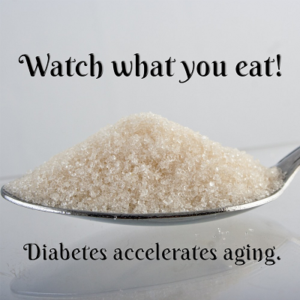 We are being made increasingly aware that diabetes is a growing health problem. Although diabetes is increasingly more prevalent in the young, it is considered to be one of the most common age-related illnesses.
We are being made increasingly aware that diabetes is a growing health problem. Although diabetes is increasingly more prevalent in the young, it is considered to be one of the most common age-related illnesses.
It is not too long ago that type two diabetes was almost unheard of in younger people. This correlation led to the assumption that type two diabetes was caused by the aging process. Increased understanding of the true cause of type two diabetes and the increasing incidence in young people has turned that thinking around.
It now begs the question – does diabetes accelerate the aging process?
Certainly, many of the complications of diabetes can make us older than our years. Statistics show that diabetic patients live four to eight years less than those people who do not have the disease. So, diabetes makes them older than their years.
Compounding Factors
Complicating this is that diabetes is rarely the only ‘age-related’ condition a person is diagnosed with. The same environmental and lifestyle factors which brought about an incidence of type two diabetes is very likely to have triggered other diseases or conditions.
Over time, a person will often be diagnosed with a cluster of age-related diseases in common with diabetes. Although attributed to aging, all of them contribute to advanced apparent aging as compared to chronological aging.
For example many may also be diagnosed with:
- Cardiovascular diseases
- Impotence
- Vision and hearing problems
- Skin diseases
- Memory loss and cancers
Some of these diseases and conditions can be traced to environmental causes such as toxins and poisons, such as those that are known to be carcinogenic.
Type Two Diabetes – Cause and Cure
However, there is an increasing awareness and understanding that the root cause of type two diabetes are lifestyle factors, the main one being diet. Lack of exercise can be a contributing factor, but it is secondary to what has been eaten.
The realization that they have been responsible, through past actions, for their condition, can be a shock for a newly-diagnosed diabetic. However, this same knowledge should give hope to them that changing their lifestyle can also bring about a reduction or even a reversal of the disease.
It should also give inspiration to those diagnosed as pre-diabetic, obese or overweight, and to anyone concerned that their current indulgences may lead to type two diabetes in their future.
Lifestyle Changes
It is never too late to take personal action to prevent or mitigate the effects of diabetes, but obviously, the earlier changes are made, the less damage will be caused to the body. This will mean increased longevity and quality of life.
It can be extremely difficult for someone diagnosed with type two diabetes to overcome the natural resistance to undertaking an exercise program, or making wholesale changes to their diet. The lifestyle choices that led to developing the condition are excessive consumption of simple carbohydrates, usually in conjunction with insufficient physical exertion.
A consequence of this usually an overweight condition, even obesity, which is often a precursor of pre-diabetes, then ultimately diabetes.
This situation occurs over time and although the patient may not be emotionally happy with their state, it can be hard to push through to make the needed lifestyle changes. Habits can be hard to overcome, especially when the choices are between unaccustomed physical exertion and relaxing, or between eating a favorite treat and a less tasty, healthier food choice.
Lifelong Consequences
Once type two diabetes has taken hold, some damage to organs and tissue is almost certain. While the diabetes itself may be reduced or reversed, this damage will remain. This can include vision impairment and loss of extremities or limbs due to gangrene.
In conclusion, diabetes certainly takes years off a person’s life and can be seen as accelerating the aging process. Therefore, it could easily be stated that if you prevent the onset of diabetes you could delay the onset of premature aging.






